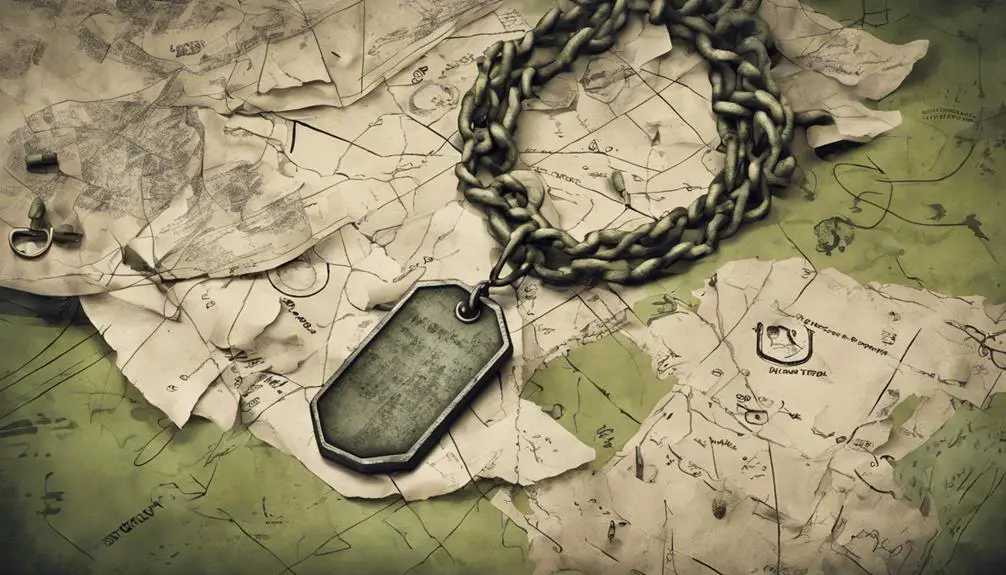You're about to immerse yourself in the world of military slang, where 'HOOAH' and 'Oscar Mike' are everyday phrases that convey vital information efficiently. In the military, language is essential for effective communication, especially in high-pressure situations. From 'Lima Charlie' (mission confirmed) to 'HOOAH' (a loud, enthusiastic yes!), specific terms guarantee clarity and coordination. As you explore military slang, you'll discover how it's used in the field to minimize confusion and maximize efficiency. Now that you've got a taste of the lingo, you'll want to learn more about the world of military communication – and what's waiting for you next.
Boot Camp Basics
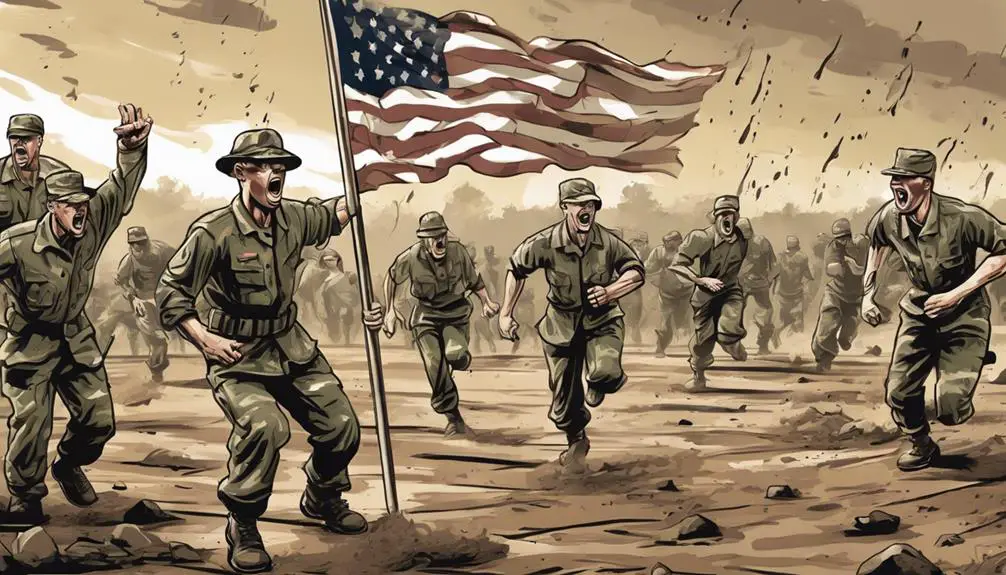
During your initial weeks in the military, you'll encounter a flurry of unfamiliar terms and jargon that may leave you feeling like a 'FNG' (Freaking New Guy), but mastering Boot Camp Basics is essential to survival in the military culture.
You'll soon realize that Basic Training is where the military instills its core values and principles in new recruits. It's during this phase that you'll meet your Drill Instructor, a seasoned veteran who'll push you to your limits, test your resolve, and whip you into shape. Your Drill Instructor is responsible for transforming you from a civilian into a disciplined, obedient, and effective member of the armed forces.
In Basic Training, you'll learn the fundamental skills necessary to succeed in the military. This includes physical training, combat skills, and military protocol. You'll also learn the importance of teamwork, discipline, and camaraderie.
Battlefield Lingo
As you progress beyond Basic Training, you'll encounter a unique language on the battlefield, where 'HOOAH' means 'yes' and 'Oscar Mike' means 'on the move'. This tactical tongue is used to convey critical information quickly and efficiently, guaranteeing effective communication in high-pressure situations.
Combat Codes, like 'Lima Charlie' for 'loud and clear', are used to confirm receipt of messages. You'll also learn to use phonetic alphabets, such as 'Alpha' for 'A' and 'Bravo' for 'B', to clearly communicate letters and numbers.
In the heat of battle, every second counts, and using this specialized language helps to minimize confusion and ensure seamless coordination. As you become more familiar with battlefield lingo, you'll find yourself using it instinctively, just like a seasoned pro.
Ranks and Roles
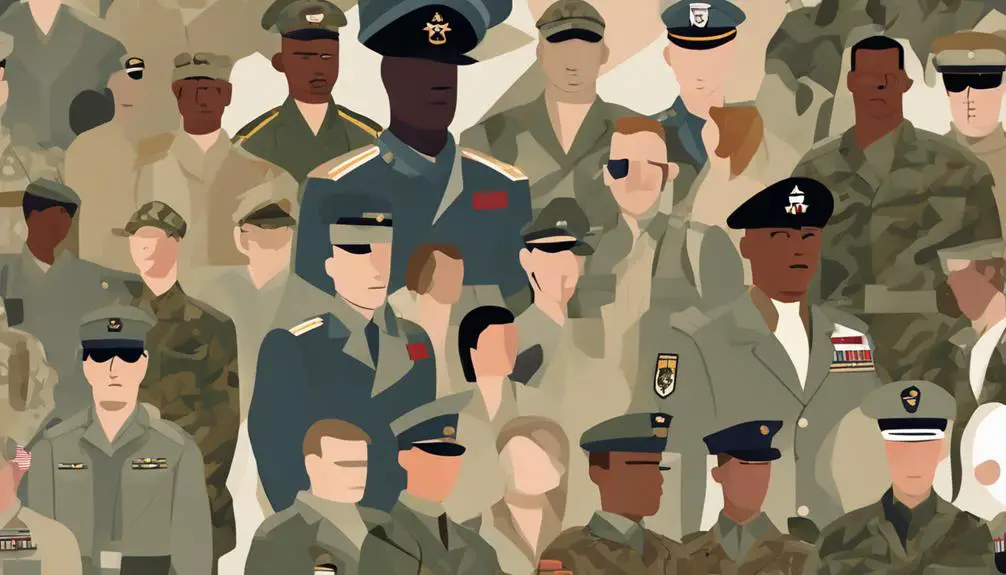
You'll encounter a hierarchical structure of ranks and roles in the military, each with distinct responsibilities and expectations. As you navigate the military's organizational chart, you'll notice various ranks, from junior enlisted personnel to senior officers. Each rank is denoted by unique Rank Insignia, which are worn on uniforms to indicate an individual's position within the hierarchy.
Officers, in particular, are expected to uphold Officer Etiquette, a set of guidelines governing their behavior and conduct. This includes adhering to strict protocols for saluting, addressing superiors, and maintaining a professional demeanor. Understanding these protocols is essential, as they foster respect, discipline, and cohesion within the ranks.
As you learn to recognize and address different ranks, you'll better comprehend the military's chain of command. This knowledge will help you communicate effectively with personnel from various branches and units. By grasping the intricacies of ranks and roles, you'll be better equipped to navigate the complexities of military life.
Tactical Operations
In tactical operations, you execute missions and maneuvers under the guidance of superior officers, adhering to established protocols and standard operating procedures to achieve strategic objectives.
You'll participate in tactical insertions, where you'll be inserted into a hostile or sensitive area to gather intel or conduct operations. These insertions often require covert recon, where you'll conduct surveillance or reconnaissance to gather essential information without being detected.
In these operations, you'll work closely with your team to achieve the mission objectives. You'll need to be adaptable, flexible, and able to think on your feet as situations can change rapidly.
Your training and experience will be critical in making quick decisions and executing complex maneuvers.
Military Jargon 101
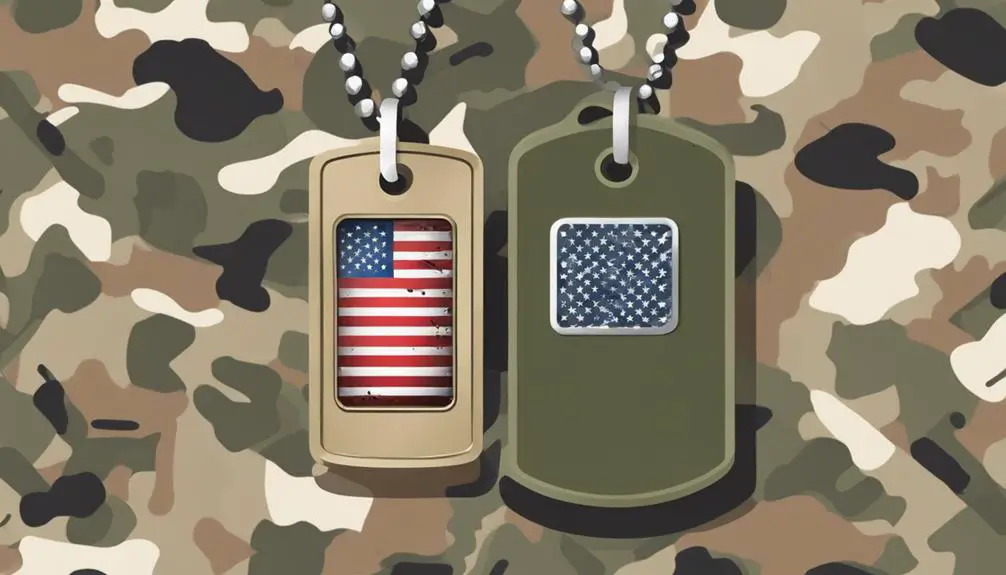
Frequently, military personnel use specialized terminology to convey complex ideas quickly and efficiently, and mastering this jargon is essential to effective communication in the field. You'll encounter acronyms, abbreviations, and technical terms that might seem like a foreign language at first, but with practice, you'll become proficient in no time.
| Term | Definition | Example |
|---|---|---|
| COMMS | Communications | "We need to establish COMMS with HQ ASAP." |
| OPSEC | Operational Security | "Remember to maintain OPSEC when discussing the mission." |
| SIGINT | Signals Intelligence | "The SIGINT team intercepted enemy transmissions." |
| EOD | Explosive Ordnance Disposal | "Call in the EOD team to defuse the bomb." |
As a code breaker, you'll need to navigate language barriers and decode messages quickly. Mastering military jargon will help you do just that. By understanding these terms, you'll be able to communicate effectively with your team and stay one step ahead of the enemy. Remember, in the military, clarity is key, and using the right terminology can mean the difference between success and failure.
Slang in the Field
On the battlefield, slang terms become an essential part of everyday communication, allowing soldiers to convey complex ideas quickly and efficiently. You'll often hear tactical chatter, a mix of formal and informal language, used to convey critical information during operations. This field jargon helps guarantee miscommunication and ensures that troops can respond rapidly to changing situations.
As you're deployed in the field, you'll pick up on colloquialisms and abbreviations that facilitate swift decision-making. For instance, 'SITREP' (situation report) and 'OPSEC' (operational security) become integral to your vocabulary. These terms enable you to rapidly assess and respond to threats, guaranteeing the success of your mission.
In the heat of battle, every second counts, and using slang terms like 'HOOAH' (an expression of excitement or approval) or 'FUBAR' (fouled up beyond all recognition) helps maintain a sense of camaraderie and shared understanding among troops.
Declassified Expressions
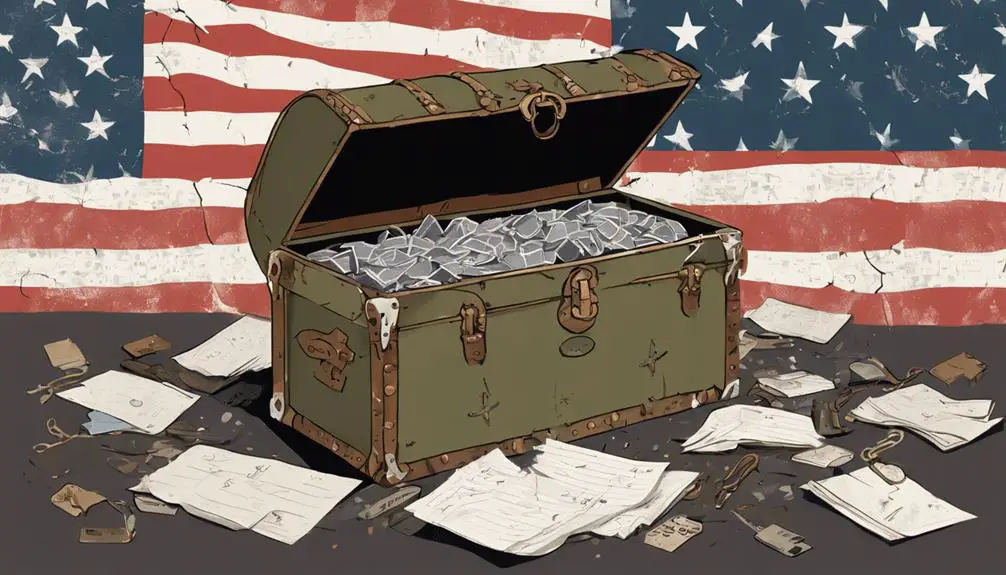
You'll explore declassified expressions that were once reserved for classified briefings, but are now widely used in military circles. These terms have been purged of their sensitive information, making them accessible to a broader audience.
As you investigate the world of declassified expressions, you'll discover phrases that were once shrouded in secrecy.
Here are a few examples of declassified expressions you might come across:
- Burst Transmission: A method of secret communication where a message is transmitted in a short, high-speed burst to evade detection.
- One-Time Pad: A codebreaking terminology that uses a random key to encrypt and decrypt messages, ensuring secure communication.
- Echelon: A secret communication system used for intercepting and processing signals intelligence.
These declassified expressions offer a glimpse into the world of secret communication and codebreaking terminology.
As you explore these terms, you'll gain a deeper understanding of the military's approach to secure communication and the methods used to protect sensitive information.
Frequently Asked Questions
Are Military Slang Terms Used Universally Across All Branches?
You might think military slang terms are used universally across all branches, but that's not entirely true. Branch variations and inter-service differences play a significant role in shaping the language used by service members.
While some terms are widely recognized, others are unique to specific branches or even units. You'll find that Army, Navy, Air Force, and Marine Corps slang often overlap, but each branch has its distinct flavor, reflecting their unique culture and history.
Can Civilians Use Military Slang Without Offending Veterans?
You're curious about using military slang without offending veterans.
Let's consider an example: a friend, not a veteran, uses 'Hooah' to express excitement. While it might seem harmless, it raises questions about cultural appropriation.
When civilians adopt military slang, it can blur the lines of social identity, potentially disrespecting the experiences of those who've served.
To avoid offense, it's essential to understand the origins and context of these terms, ensuring respectful usage.
How Do Military Slang Terms Evolve Over Time?
As you explore how military slang terms evolve over time, you'll notice it's a dynamic process. Language adaptation plays a significant role, driven by the need for efficient communication in high-stress environments.
Cultural influence also shapes slang, as different branches and units develop their own unique terminology. You'll find that military slang is constantly adapting to reflect the changing nature of warfare, technology, and societal values.
Are Military Slang Terms Used in Formal Military Communications?
You're about to immerse yourself in the world of formal military communications, where clarity is key. Just like a surgeon wielding a scalpel, precision is vital.
In formal military communications, you won't find slang terms sneaking their way in. Official language is the norm, adhering to formal protocol. Slang is reserved for casual conversations among troops, not in official reports or briefings.
The language is crisp, clear, and concise, ensuring zero miscommunication.
Can Military Slang Be Used to Identify a Fake Military Veteran?
You might wonder if military slang can be used to identify a fake veteran. While it's not a foolproof method, it can be a useful tool in fake veteran profiling.
Authenticity testing involves analyzing a person's language, including their use of military slang, to detect potential impostors. However, it's crucial to combine slang analysis with other verification methods to guarantee accuracy.
Conclusion
Now that you've got a grip on common military slang terms, remember that there's more to learn.
As you venture deeper into the world of military jargon, be prepared to decode cryptic messages, decipher tactical ops, and uncover the nuances of ranks and roles.
Stay vigilant, because in the world of military slang, knowledge is power – and you're just one misstep away from being 'lost in the sauce.'

